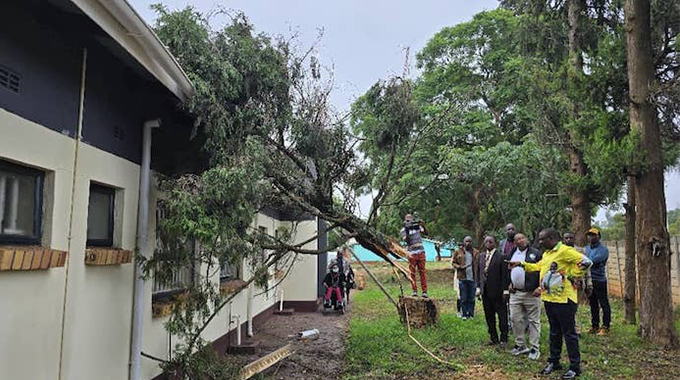Concrete beehive enterprise thrives in Gokwe

Patrick Chitumba, [email protected]
A GOKWE town fabricator who replaced wooden beehives with concrete ones, a unique eco-friendly material, is changing lives in the cotton farming town as he now employs 16 people to assist him in making the apiaries.
Mr Petros Mazvi (60) became famous after inventing a foot-operated hand-washing device following the outbreak of Covid-19 and the gadget made sanitising hands easy.
He has mastered the art of making cement hives for beekeepers, and a single cement beehive costs about US$15.
Mr Mazvi makes about US$2 000 a month from selling the beehives and is assisting his employees eke out a living thereby contributing to the socio-economic development of Gokwe town.
“We have got the capacity to produce 210 hives per day, which translates to 3 320 beehives per month. However, we haven’t reached that capacity because we are still working on penetrating the beekeeping market,” he said.
“At the moment we are concentrating on Gokwe and plans are underway to go national. President Mnangagwa has been taking the “Nyika inovakwa nevene vayo/ Ilizwe lakhiwa ngabanikazi balo” philosophy across the country. It is us Zimbabweans who have to play a role in achieving that and that is what I am doing through my innovation.”
Mr Mazvi said bee-keeping remains a high return and low risk agro-business hence the need for concrete beehives.
Bee-keeping has the potential to contribute significantly to food and nutrition security as espoused in the National Development Strategy (NDS 1).
There are more than 50 000 beekeepers in Zimbabwe today as local demand for honey is growing both on the formal and informal markets.
Demand is usually high, especially during winter due to the prevalence of colds and flu. Drinking tea mixed with honey is a home remedy to soothe a sore throat. Honey is believed to be an effective cough suppressant.Beekeeping can be an essential lifeline for smallholders and subsistence farmers in rural areas to generate income.
Bees are well known for honey production, but they also provide other marketable products, such as pollen, propolis, royal jelly, venom, queens and their larvae.
Traditionally, fixed comb hives are usually made from barks or logs. They are cheap to acquire but pose an environmental burden hence not sustainable and no longer encouraged. Deforestation to ring barking and logging destroys forests.
However, wood has a negative impact on surrounding woodlands as hives are made from chopped trees.
Some beekeepers have used plastic hives, but plastic is unsuitable as it is non-recyclable and bees are put off by its smell.
Plastic can be chemically treated to overcome the smell, but this could negatively affect bee health and the environment.
Mr Mazvi said he got some little knowledge of engineering after briefly undertaking an automobile engineering course through distance learning, which he, however, failed to complete.
“My mind is saturated with innovations, and remember I invented the foot-operated hand wash facility for the hygiene of the community and nation at large nationwide. Then the second innovation is the concrete bee hive project to help save trees, and again this project started in the year 2 000, but is getting traction now,” he said.
With a wealth of experience in welding spanning 25 years, Mr Mazvi said he is working on incorporating his innovations into his company Etpetbon Enterprise (Pvt) LTD , which was registered in July last year.
Mr Mazvi said the concrete hives are more protective, better insulated, and resistant to fires, badger proof, vandal-proof, cheaper and more durable than the typical wooden versions.
“I realised that we needed a beehive that is affordable and durable so that it can address issues to do with theft, vandalism, fires, pests, diseases, and maintenance. Cement hives are permanent,” he said.
Midlands Provincial Forestry Commission manager Mr Rodrick Nyahwai said bees in concrete hives are protected against weather conditions and parasites.
“The cement hives cannot be damaged by honey badgers, but some don’t want them because they say cement hives change the quality of honey.
Timber hives produce good honey with original taste, but also have challenges such as honey badgers and deforestation which should be controlled to save our forests,” he said.
Analysts attribute low production in Zimbabwe to poor coordination, lack of appropriate technologies and poor beekeeping practices.
The Agricultural Marketing Authority (AMA) has been calling for apiculturists to register with them so that there is a coordinated production of honey and related products.
With its medicinal and nutritional value, honey will always be on demand all-year-round.












Comments